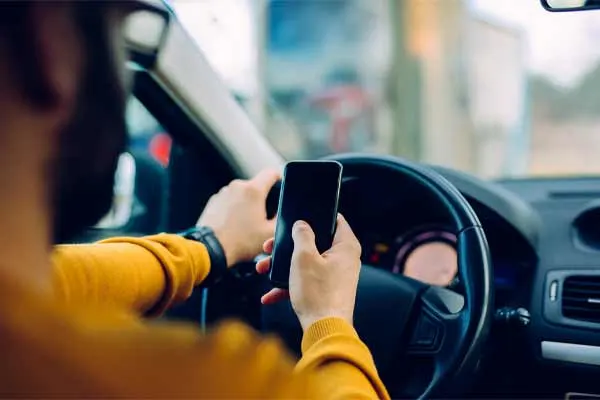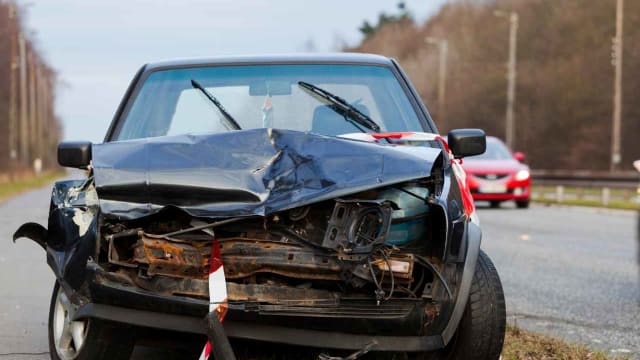Driver distractions are incredibly dangerous. Despite fairly stringent traffic laws in Illinois related to distracted driving, motorists still use phones, eat, and engage in other behavior that can affect their driving and lead to accidents. Because of this, police are often on the lookout for drivers who are not paying attention and, consequently, will ticket them.
In this article, we’ll discuss the four types of distractions that most drivers encounter on the roadways. It’s essential to know about these 4 types of distractions while driving because this knowledge can help you improve your safety when you’re driving your vehicle.
If you’ve been ticketed for distracted driving, it’s essential to speak with an experienced traffic attorney as soon as possible. At Dohman Law Group, our legal team can advise you on your options and how you can maintain a clean driving record. To schedule a free, no-obligation consultation, call our Rolling Meadows traffic law firm today at (847) 616-9993.
What are the 4 Primary Types of Driving Distractions?
Each day in the U.S. about 8 people are killed in fatal accidents involving distracted drivers.
Distracted driving is performing the task of driving while doing another task that takes your attention away from driving. Driver distractions can increase the odds of being involved in a motor vehicle crash.
Talking on your cell phone, using the navigation system, sending a text message, and eating or drinking coffee while driving are a few instances of distracted driving. These distractions endanger your life, your passengers, and other people on the roadway. The 4 common types of driver distractions include:
Visual Distractions
Anytime a driver takes their eyes off the road, they’re endangering themselves and other people around them. Often, drivers get visually distracted because of technological advances. Drivers have a tough time keeping their hands off of their electronic devices. This is somewhat understandable because most of us conduct our daily routines through a mobile phone.
Unfortunately, statistics from the Centers for Disease Control and Prevention (CDC) show that if a driver is driving their car at 55 miles per hour and takes their eyes off the roadway to receive or send a text message, this is equivalent to driving the length of a football field with your eyes closed.
Manual Distractions
When a driver takes their hands off the steering wheel, this is referred to as a manual distraction. A driver could take their hands off the wheel when driving because of many reasons, including operating a cell phone. However, mobile phones aren’t the only types of distractions that could take a driver’s hand off the steering wheel.
This type of driver distraction can also happen when a driver adjusts the Gps or radio station, reaches for food in the back seat or the other seat, or reaches for something in the back seat or the other seat.
Auditory Distractions
Even though most drivers are used to having the radio on in their vehicles; noise is a distraction. Some people think that listening to music will keep them from being distracted, but this isn’t always true. Catchy music or even loud music can cause you to take your mind off of the task of driving. Further, loud music inside the car may keep you from hearing what’s going on outside of the motor vehicle.

This is dangerous, especially if there is an emergency vehicle that needs to get by. Even hands-free calls can be a distraction if they take your mind off of driving. Often, drivers use wireless earbuds while they are inside their motor vehicles. While these devices offer an excellent auditory experience, never use them while driving.
Cognitive Distractions
The last type of driver distraction is a cognitive distraction. This distraction entails everything that takes a driver’s mind off of driving. Cognitive distractions include talking on the phone, chatting with passengers, daydreaming, or reading books, text, or maps. When a driver is operating a motor vehicle, their focus must be on roadway safety and getting to their destination safely.
Who is Most at Risk for Driver Distractions?
In the United States in 2018:
- 25% of the distracted drivers involved in fatal traffic crashes were young adults aged between 20 and 29 years.
- Underage drivers aged between 15 and 19 years were more likely to get distracted than older drivers aged 20 and above, and these drivers were involved in fatal crashes where someone died.
- 9% of all teenagers who died in traffic crashes were killed in auto crashes involving distracted driving.
How Can I Prevent These Types of Distractions while Driving?
Drivers should avoid multitasking while driving. Whether it’s eating a sandwich, adjusting the radio station, making phone calls, reading an email, or sending a text message–avoid doing all these while driving. Also, drivers can use apps to help them avoid using their mobile phones while driving.
Passengers should speak if they’re in a vehicle with a distracted driver. They should ask the driver to focus on the task of driving. Also, as a passenger, you can eliminate distractions for the driver by helping him or her with navigation or other activities.
Parents must talk to their teens or young adults about the responsibilities and rules involved in driving. Remind younger drivers that driving is a primary task that requires the driver’s maximum attention. Emphasize that phone calls and text messages can wait until they arrive at their destination.
Penalties for Distracted Driving in Illinois
According to the NHTSA, distracted driving is six times more dangerous than driving under the influence, and drivers who are texting reacted 23% slower than intoxicated drivers. A driver who gets a distracted driving ticket will pay a $75 fine for the first offense, and fines increase with each subsequent offense.
The offense and fines may be escalated even further to include Class A misdemeanors if you cause an accident, or if it results in serious injury you can face a Class 4 felony. Failure to follow the hands-free driving laws for talking on the phone in the car has the same consequences as texting while driving.
Contact a Skilled Traffic Defense Attorney for Legal Help!
If you have received a ticket for distracted driving, you must speak with a knowledgeable attorney as soon as possible. An experienced attorney can use their expertise and resources to investigate the incident and help you defend yourself against any criminal charges you make face. To schedule a no-cost legal consultation, contact one of our skilled Rolling Meadows criminal defense attorneys today at (847) 616-9993.


